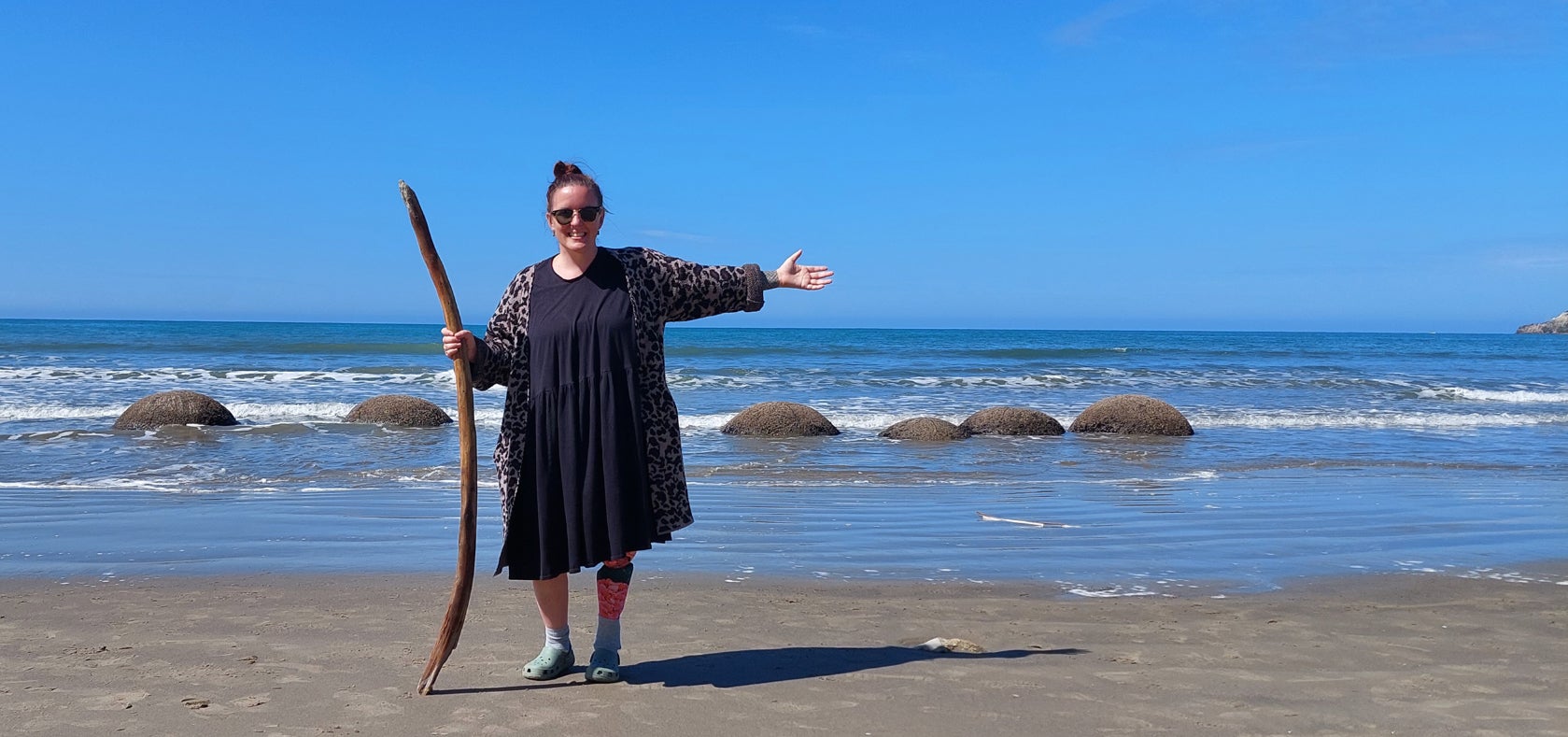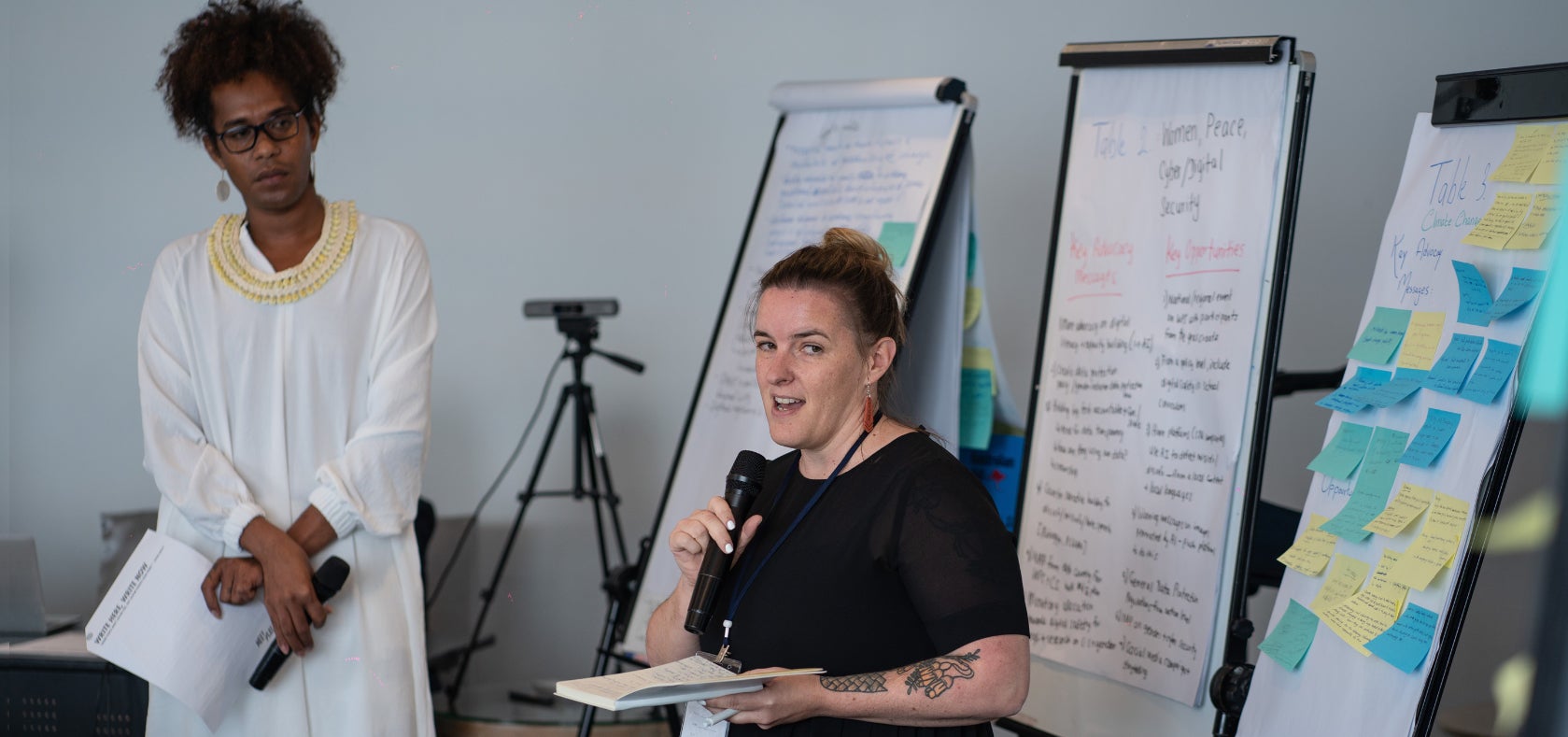Women, Peace and Security Champion Profile: Robbie Watene
Date:
Individuals and organizations who are championing the Women, Peace and Security agenda in Asia and the Pacific are being profiled by UN Women – online and in our 2025 desktop calendar – to mark the agenda’s 25th anniversary.

Based in New Zealand, Robbie Watene PhD specializes in inclusive and accessible peacebuilding and the human rights of persons with disabilities. She oversees a team of disabled and disability researchers and disability rights research projects at the Donald Beasley Institute in Dunedin and is co-founder of The Lucy Foundation, a social enterprise named after her prosthetic limb, ‘Lucy leg’. She was among the young leaders for Women, Peace and Security who took part in Gen-Forum 2024, a UN Women youth conference.
How do you view the current status of women’s participation in peace and security processes in the Pacific?
“I actually feel encouraged and hopeful. There’s still a gender divide, but it’s not insurmountable. It just takes getting the right people at the table.
We still see challenges with patriarchal systems that limit and challenge women's roles. But, on the other hand, what I'm seeing – and particularly from the women with disabilities who I’ve engaged with – is incredibly passionate, powerful, informed, empowered women with disabilities who are demonstrating how their experiences mean they're navigating a world that wasn't built for them.
Even so, their incredible problem-solving skills, resilience and strength is being utilized from the grassroots all the way through to official, high-level tables and boardrooms where their voices are being not just invited into the space, but are being heard and responded to. Their experiences and problem-solving skills are being valued.
I just hope we can maintain this momentum, despite some of the circumstances that we're dealing with globally, and continue to build the capacity, voice and leadership of women in peace, conflict resolution and other contexts in our beautiful part of the world.”
What does the 25th anniversary of UN security council resolution 1325 mean to you?
“It’s bitter-sweet because I think it's cause for celebration, yet also cause for reflection and concern.
This is an interesting time in history. We're witnessing a resurgence of conflict internationally. We’re seeing policies around the world that seem to be challenging the huge strides we’ve made. I feel a fist in my stomach and am motivated to protect the space because we cannot go backwards.
Looking at how far we’ve come, especially in the sense of gender and peace processes, there are exciting things to think about. We do have quite a unique context in New Zealand. We've had female Prime Ministers who’ve been involved in peacebuilding and security activities. For example, just think back to the March 2019 attacks on the mosque in Christchurch and the role of women's leadership in the aftermath.
As we look to the future, we cannot sit back and celebrate for too long because there’s still more work to do. We have to work really hard globally, regionally and domestically, to ensure that we protect the gains, experiences, opportunities and leadership under the WPS agenda. If we don’t continue that work, even in our little corner of the world, there’s a risk of our hard fought-for rights and position in the WPS global sphere being challenged and rolled back.
So, we must keep pushing and I think women are integral to that. In Māori culture, women are the beating heart of relationships, of ‘whānau’ [Māori word for ‘family’], so they have an incredibly important role to play in all aspects of life. They’re at the heart of conflict resolution. I feel fortunate to be surrounded by wāhine toa and kaumātua - strong women and elders in my community who guide, inform, mentor, build relationships, repair and heal.”
What are you hoping will happen with the recommendations developed by the young WPS champions who were part of the Gen-Forum 2024 conference?
“I would hope our recommendations don't just turn into a document that collects dust on the shelf. It was a snapshot in time of a group of young peacebuilders contributing to a conversation for a future they want to see and live to experience.
I want us to see these recommendations grow and change as our world changes. I hope that we, as a cohort, continue to be invited back to the table to keep informing that conversation, as well as other young people. Because often, something we risk – particularly in the disability community, and I'm sure amongst other communities as well – is that our involvement can be a ‘tick-boxing’ exercise whereby women with disabilities talk about their experiences, contributions and dreams, and that’s the end of our involvement. Others say they will take it forward from there.
At the forefront of my thinking is DEI – diversity, equity, inclusion. There’s a risk we will lose the gains we’ve made in the space of DEI. Diversity, equity, inclusion for me embodies an intentional effort to ensure that the ‘fringe voices’ – or the voices that have traditionally existed in the margins – are centred in the discussions moving forward.
This was what I hope was my contribution to the Gen-Forum recommendations: that we're not forgetting about our people, our women who have intersectional experiences; our women with disabilities; our indigenous women; our non-binary and gender-diverse community members; our young women; our women in rural populations.
The more we can centre the voices of those who are most affected by the peace and security challenges we’re facing, including emerging issues, then the more hope we can have for ensuring the solutions are going to be sustainable for everyone. Because what's good for our fringe community is going to be good for all women. I think we've done some great things in this space, and Gen-Forum was an example.”

What’s the key to engaging young people in the WPS agenda, especially in the Pacific region?
“When you rattle-off the words ‘Women, Peace and Security agenda’ it might not be immediately clear, especially to our young women, what this means in their everyday life. We have young people who are empowered but who may not automatically make the link between what they’re already doing and this bigger, extremely relevant WPS agenda that directly relates to things they’re passionate about.
Thinking of New Zealand, we have an incredibly engaged cohort of young people. You only have to look at what's happening with our indigenous rights to see some of the empowered young Māori women who are creating ripples, not just here, but around the Pacific and globally.
I'm not an indigenous person but as a disabled person I know what it’s like to be part of a minority. I hope I can use my knowledge of the WPS agenda to bring that into conversations throughout our diverse minority communities and say ‘Hey, did you know there are people in our region who have approaches and tools you could use? Let's talk.’
By continually pressing that there’s this global community - we might be doing things in different ways in different communities – but we have the same ambition of a society that’s safe, features women’s leadership and has positive peace and security – whether its food security, physical security or climate security – and we can work on this together.”
See also: